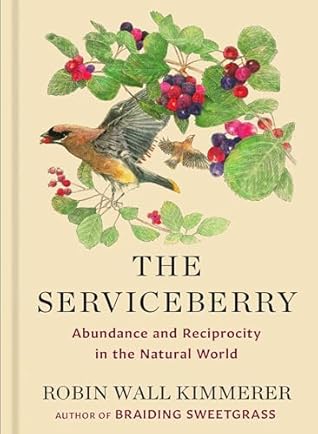More on this book
Community
Kindle Notes & Highlights
Read between
June 11 - June 11, 2025
Ethnobotanists know that the more names a plant has, the greater its cultural importance.
it all comes from the Earth. When we speak of these not as things or natural resources or commodities, but as gifts, our whole relationship to the natural world changes.
Recognizing “enoughness” is a radical act in an economy that is always urging us to consume more.
Ric Dragon liked this
If our first response to the receipt of gifts is gratitude, then our second is reciprocity: to give a gift in return.
keeping the gift in motion in a way that is open and diffuse, so that the gift does not accumulate and stagnate, but keeps moving,
Abundance is created by recycling, by reciprocity.
To name the world as gift is to feel your membership in the web of reciprocity. It makes you happy—and it makes you accountable.
In a gift economy, wealth is understood as having enough to share, and the practice for dealing with abundance is to give it away. In fact, status is determined not by how much one accumulates, but by how much one gives away. The currency in a gift economy is relationship, which is expressed as gratitude, as interdependence and the ongoing cycles of reciprocity. A gift economy nurtures the community bonds that enhance mutual well-being; the economic unit is “we” rather than “I,” as all flourishing is mutual.
A gift economy includes a system of social and moral agreements for indirect reciprocity, rather than a direct exchange
The prosperity of the community grows from the flow of relationships, not the accumulation of goods.
We live in the tension between what is and what is possible.
The question that’s often asked is how do we take gift economies from individual relationships and scale them up? I have to say that I’m not sure that’s the right question. Why does everything have to be expanded? It is the small scale and context that make the flow of gifts meaningful. But if gift economies are to have impact, I’m willing to think about what that might look like on a community scale.
Know the ways of the ones who take care of you, so that you can take care of them.
The practice of observing the living world and taking inspiration for human ways of living from its model is an essential element of Indigenous science. It embraces the reality that there are intelligences other than our own, from whom we might learn.
Continued fealty to economies based on competition for manufactured scarcity, rather than cooperation around natural abundance, is now causing us to face the danger of producing real scarcity, evident in growing shortages of food and clean water, breathable air, and fertile soil. Climate change is a product of this extractive economy and is forcing us to confront the inevitable outcome of our consumptive lifestyle: genuine scarcity, for which the market has no remedy.
‘Without farmers, you’d be naked, hungry, and sober.’
Disruptions create gaps, openings and edges between the new and the dominant.
Already the land is too quiet. What if our metrics for well-being included birdsong, the crescendo of Crickets on a summer evening, and neighbors calling to each other across the road?


